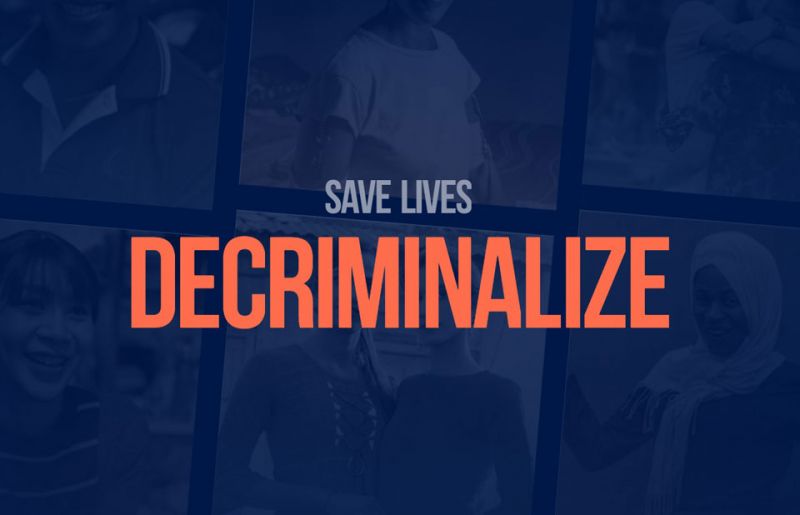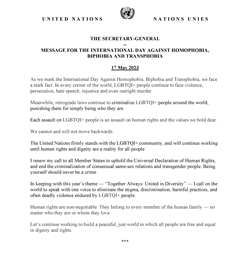On April 14th members of the Cook Islands rainbow community assembled at parliament with colourful flags and cautious optimism. It turned out to be the day they’d been working toward for the last twelve years. Parliament removed laws prohibiting consensual sex between men, striking out sections of the Crimes Act that had been on the books since the turn of the 20th century.
“This decision by Cook Islands is part of a wave of global progress around abolishing harmful laws,” noted UNAIDS Asia Pacific Regional Director, Eamonn Murphy.
“This was a huge historical moment,” said Valery Wichman, President of the Te Tiare Association, the nation’s oldest lesbian, gay, bisexual and transgender (LGBT) organisation. “It’s not just a win for the community, but also a shift in terms of our nation maturing and upholding the constitutional rights of all people.”
Ms Wichman, an attorney and public servant, is also an akava'ine—a Māori word meaning transgender woman. She attests that the anti-LGBT laws which made so-called “sodomy” and “indecent acts” punishable by imprisonment reinforced prejudices. This contributed to the LGBT community’s exclusion, harassment and bullying. She has herself experienced being mocked and assaulted.
“A lot of people chose not to live here. It was too hard for them to endure their family’s and society’s judgment. The idea that you are not worthy has carried down from parents to children and has affected how we have been treated by our peers. A lot of trans women have not gone to the doctor because they have been misgendered and have felt disrespected. There have been cases where they ended up dying,” she said.
The journey toward law reform started in 2011. The spark was the discriminatory response to the nation’s first HIV diagnosis. Te Tiare led the advocacy charge with support from organisations including the Cook Islands Family Welfare Association.
A Crimes Bill drafted around 2013 removed the discriminatory clauses. In 2017 parliament set up a Standing Committee to review its raft of proposed revisions. Support for civil society to prepare submissions outlining public health grounds for reforms was provided by the United Nations Development Programme (UNDP), the lead agency amongst the United Nations Joint Programme on HIV and AIDS working on effective democratic governance and issues affecting sexual and gender minorities.
But following a political change the next year, the committee’s Chair recommended retaining the ban on gay sex. What’s more, he proposed a new section criminalising sex between women. The bill remained in limbo for years. Reform efforts seemed to hit a wall.
A strategy of public dialogue and political engagement rooted in Cook Islands culture enabled a breakthrough. Pride Cook Islands (PCI) was formed as a sister organisation to Te Tiare, focusing on this public advocacy branch of work.
“Obviously we are in a unique situation as a small, conservative, religious population,” PCI President, Karla Eggelton began. “The work of advocacy becomes more delicate when you are living beside people making these decisions for you. We welcomed support from international allies, but we knew we had to do this our own way and have our own approach that is mindful of the situation and culture we live in.”
First TCI tackled messaging. There were deep deliberations around word choice. The mandate was to keep the conversation simple. Ultimately the cause was framed as an equality issue. The rallying cry became, ‘don’t make us criminals in our own country’.
The organisation stayed in communication with policymakers on both sides of aisle. They not only explained their position, but sought to understand politicians’ concerns.
The group met with traditional leaders who are grassroots decision-makers. Village communities were invited to have conversations during public meetings.
“It offered an opportunity for us to understand the misperceptions. We were able to explain that all we are asking for is to not be made criminals. People said, ‘we don’t want to send you to jail, we love our neighbours and our family’,” Ms Eggelton remembered.
The organisation’s patron is Lady Tuaine Marsters whose husband, Sir Tom Marsters, is the British King’s Representative. Lady Marsters frequently attended consultations. Other spokespersons included parents and people with standing in the church. At times supporters were invited to simply stand in solidarity. But anyone who would speak was carefully prepared.
“We spent hours articulating what we would say. We reaffirmed our pledge to not become emotional. We had to keep each other in check to make sure we did not say anything we could regret,” Ms Eggelton outlined.
Then came an effort to increase visibility. The call for equality was largely coming from the LGBT community. They needed other people to demand the same. So PCI embarked on a campaign for people to show their support either by lending their voice to the public dialogue or flying the rainbow flag. The group distributed free flags, urging people to fly one for their daughter, son or grandchild. From restaurants to bars, t-shirts to earrings, the display of support resonated.
A first-of-its-kind pride ad on TV, newspapers and radio challenged Cook Islanders: “We are good enough to be your teachers, nurses, choreographers, dressmakers and orators… but not good enough in the eyes of the law. We are already part of your community, we are just asking you to recognise us as equals.”
This visibility and advocacy work was supported by UNDP through the Being LGBTI in Asia and the Pacific program. PCI developed a project to strengthen the digital capacities of community organisations. A critical outcome was the Pride Pledge Cook Islands initiative with the business community which provides visible safe spaces for LGBT people.
“The UNDP support was instrumental in promoting acceptance and awareness and utilising digital tools to share our message,” Ms Eggelton said.
TCI conducted frequent polls to gauge public sentiment. At the start of the process they lagged behind reform opponents. But by the time would-be Prime Minister, Mark Brown, made an election promise to change the law last year, public sentiment had tilted.
“Once we were able to establish that it was really about equality, then we saw a changing of the tide,” Ms Eggelton reflected.
Ultimately the entire government bench voted in favour of an Amendment Bill while opposition leader, Tina Brown, and two of her Members of Parliament also supported.
Renata Ram, UNAIDS Country Director for Fiji and the Pacific, noted that seven other countries in the Pacific region retain laws criminalising same-sex relations.
“The Cook Islands example proves that along with law reform we can have national dialogues about inclusion, justice and equity,” Ms Ram said.
At a national ceremony marking the end of the South Pacific cyclone season the rainbow community gathered once more, this time to give thanks.
“We want to make sure people understand our gratitude for everything that has transpired and for everyone who worked hard to achieve this,” Ms. Eggelton said. “Our community is now recognised through the eyes of the law as being equal. Now people can feel safe, not like second class citizens.”





